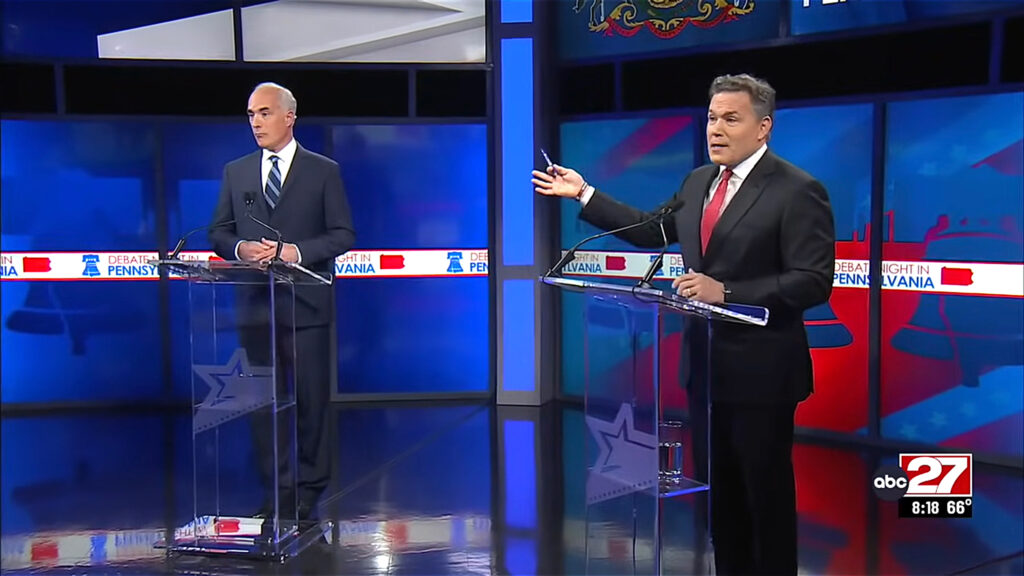During the first debate between Pennsylvania’s U.S. Senate candidates, the central theme was accusations of dishonesty. Democratic Sen. Bob Casey and Republican Dave McCormick both accused each other of misinformation regarding their records. Casey alleged McCormick was deceitful about his residency, while McCormick promoted his campaign’s website, “CaseyLies.com.”
Energy issues were highlighted as candidates addressed fracking, nuclear power, and the potential sale of U.S. Steel to Japan’s Nippon Steel.
The debate lacked real-time fact-checking, prompting a review of key environmental claims made by both candidates.
McCormick: “We constrained our natural resources, particularly fracking… And essentially, what’s happened is we’ve lost our ability to be energy dominant.”
Verdict: False
McCormick claimed Casey constrained natural resources by supporting misguided energy policies, supposedly reducing Pennsylvania’s energy dominance. However, Pennsylvania’s natural gas production has increased 43 times since Casey’s 2006 Senate election. U.S. natural gas output has also grown in recent years.
Casey: McCormick “has been lying about my position on fracking. I voted against a fracking ban.”
Verdict: True
Casey asserted his consistent support for fracking, voting against a 2021 fracking ban. McCormick’s accusation regarding red tape relates to Casey’s backing of the FRAC Act, which sought to disclose fracking chemicals.
The American Petroleum Institute argued this could harm the gas industry, though the bill stalled in committee. Casey supports “responsible” fracking with stringent monitoring.
Casey: “I supported legislation just two years ago that made the greatest investment in clean energy in American history, allowing us to combat climate change, and at the same time, have supported an all-the-above energy strategy for Pennsylvania.”
Verdict: True
Casey endorsed President Biden’s Inflation Reduction Act, marking significant climate and energy investments. His “all of the above” policy includes renewable energy and fossil fuels. The IRA has pro-fossil fuel measures, like oil and gas lease auctions.
McCormick: “On the LNG export ban that President Biden put in place, you know what he did to stop that? He sent a stern letter.”
Verdict: True
Casey and Senator John Fetterman criticized the Biden administration’s pause on LNG exports, citing potential job impacts. Environmental groups criticized this stance for downplaying climate concerns.
McCormick: “What I’m not in favor of is hundreds of billions of dollars of subsidies for clean energy projects that are driving inflation across our economy and across our country and making us more dependent on China.”
Verdict: False
The Inflation Reduction Act is not a major inflation driver. Economists attribute inflation spikes to post-Covid factors. The IRA aims to reduce reliance on China by boosting domestic clean energy manufacturing.
Sen. Joe Manchin noted the IRA seeks to “increase energy production” and cut reliance on China.
McCormick: “He’s been for a cap and trade program that would have set up prices. He’s for a regional gas initiative that would have raised prices.”
Verdict: Partially true
Casey cosponsored the Regional Greenhouse Gas Reduction Act, supporting programs like the Regional Greenhouse Gas Initiative (RGGI), which sets carbon emission prices. The Kleinman Center for Energy Policy predicted minimal electricity rate impact from RGGI.
McCormick: “U.S. Steel was actually going to invest billions of dollars in the Mon Valley a few years ago, and instead, it took a new plant to Arkansas. And the reason it took a new plant to Arkansas was because the Allegheny County government blocked the new project on environmental grounds.”
Verdict: Mostly false
Allegheny County did not block U.S. Steel’s $1 billion Mon Valley investment; officials were surprised by the company’s 2021 pivot. U.S. Steel cited Covid-19 permitting delays and a shift towards decarbonizing. The county executive denied blocking, and the United Steelworkers criticized U.S. Steel’s non-union Arkansas project.
Original Story at insideclimatenews.org
